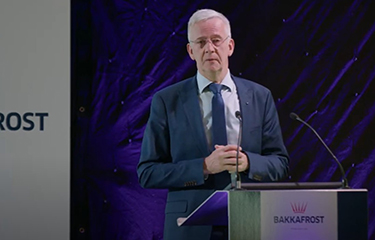Bakkafrost’s ambitious DKK 6.3 billion (USD 904 million, EUR 845 million) investment plan is still moving forward, but Bakkafrost CEO Regin Jacobsen said parts of the investment have a new focus.
The company has been making significant capital investments in both its Faroese operations and its recently-acquired operations in Scotland. Bakkafrost acquired a majority stake in the Scottish Salmon Company in 2019, and has since renamed the operations to Bakkafrost Scotland and started investing in new capacity as part of its “One Company” strategy.
The company announced an ambitious target of 200,000 metric tons (MT) of capacity across its value chain, and Jacobsen said the company is on track to produce 165,000 MT of salmon across its production sites by 2028 – with 110,000 MT of that coming from the Faroe Islands and 55,000 MT coming from Scotland.
To achieve that goal, both Scotland and the Faroe Islands are receiving significant capex over the next five years, Jacobsen said, as Bakkafrost has begun to shift its investment strategy from the original investment plan to reduce costs.
“The investments in Faroes will be taken somewhat down,” Jacobsen said on 6 June, during the company’s capital market day presentation.
According to Jacobsen, the company’s original plan to build new broodstock sites has been scrapped, in favor of repurposing older hatcheries into broodstock sites. Specifically, hatcheries in Gjogv and Husar will be repurposed for broodstock, and the company expects it will be able to produce 65 million eggs in 2028.
Previously, the company planned to build a new hatchery at Onavik, and a broodstock facility at Skalavik – but now it plans to only build a hatchery at either of the two locations. But delays in constructing the Skalavik facility would have seen the company running into smolt supply issues, Jacobsen said.
“In order to be self-supplied, we need to find other solutions. The solution we have found is cheaper and faster,” Jacobsen said.
Bakkfrost will choose to build just a hatchery either in Onavik or Skalavik, depending on which can be built faster and cheaper. The facility will produce 7.5 million 500-gram smolts annually.
“In our plan, this hatchery will start to supply from 2027,” Jacobsen said.
Bakkafrost's other plans for the Faroe Islands, including a idea to build offshore salmon farms, have been “put on hold for now,” Jacobsen said. Production costs for offshore aquaculture are significantly higher than using new technology to expand capacity at its existing licensed farms.
Additionally, using the company’s new larger smolt strategy – keeping smolt out of ocean water for as long as possible to shorten in-ocean production cycles – will allow Bakkafrost to conduct more-frequent harvests, Jacobsen said.
“We are using today more than 17 months for each cycle, despite that we could do it faster,” Jacobsen said. “That’s what we call low-hanging fruit.”
Jacobsen said there’s an “unplucked” capacity available on existing farm sites.
Modern technology, he said, has allowed the company to put salmon pens in areas that were too difficult in the past – whether due to wave heights or other issues. As a result, Bakkafrost is looking to farm in new areas, some of which the company “previously did not see opportunities to farm salmon.”
“There are new areas that are farmable that were not farmable 20 years ago,” he said.
Overall, the company plans to invest less money per kilogram of salmon in the Faroes Islands, down to DKK 7.00 (USD 1.00 EUR 0.93) per kilogram from an originally planned DKK 12.00 (USD 1.72, EUR 1.61) per kilogram.
Bakkafrost’s new plans and lower investment in the Faroe Islands comes after the government of the Faroe Islands passed a proposal increasing its revenue tax on the salmon farming industry up to a maximum of 20 percent. Jacobsen announced in Bakkafrost's Q1 2023 update the company already planned to shift its investment plan due to the proposed tax.
Photo courtesy of Bakkafrost







